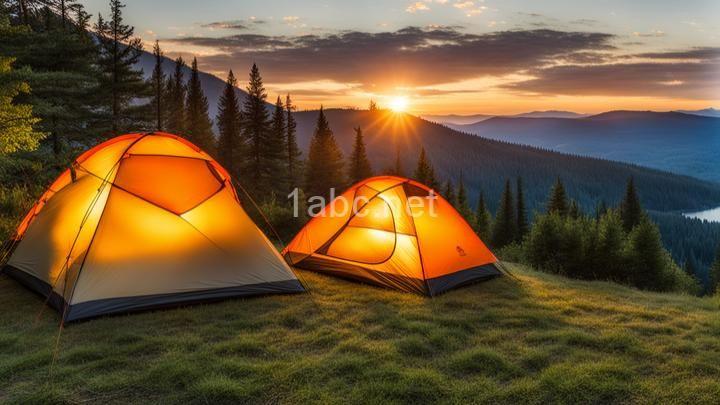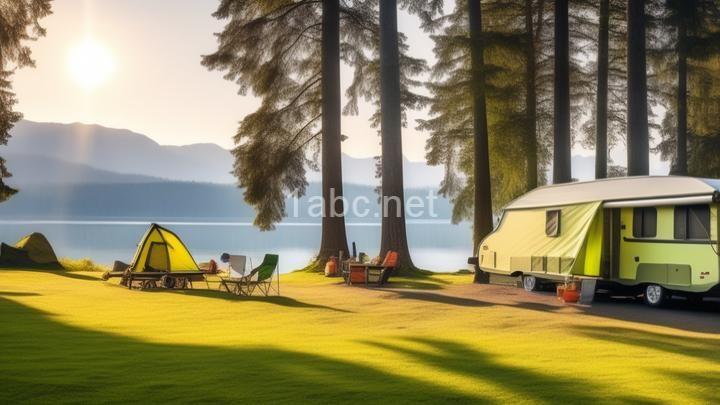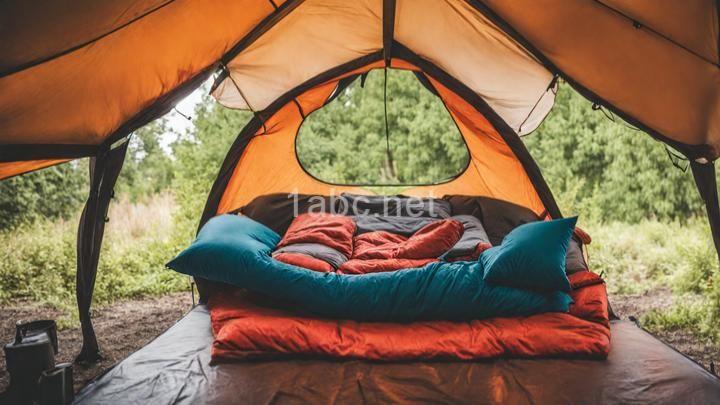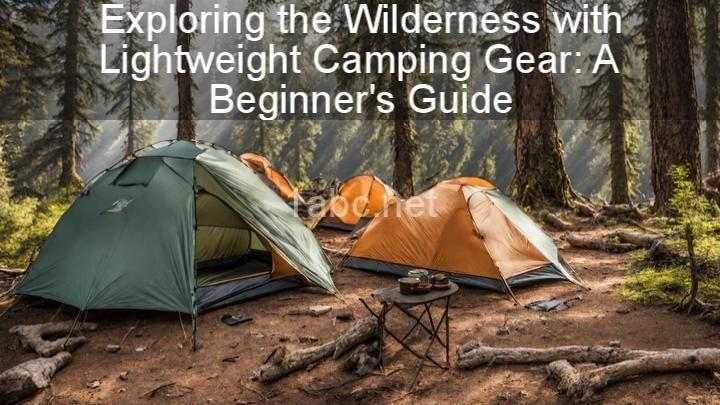Getting it Just Right: Factors to Consider When Deciding on the Perfect Tent Size for Your Camping Trip

Introduction:
Hey there, fellow adventurers! Welcome to another exciting blog post brought to you by dorenelashay9177. Today, we're diving into the world of camping and exploring the factors to consider when choosing the right tent size for your next wilderness adventure. We all know that a comfortable and enjoyable camping experience begins with the perfect tent size, so let's get started!
I. Understanding Your Camping Needs:
When it comes to selecting the ideal tent size, understanding your specific camping needs is crucial. Think about the number of campers who will be joining you on your trip. Are you camping solo or with a group of friends? This will determine the size of the tent you should be looking for.
But wait, there's more! Don't forget to consider your gear storage requirements. You don't want to end up with a tent that's bursting at the seams because you didn't account for your camping equipment. Additionally, think about your desired comfort level. Do you prefer a little extra space to stretch out or are you fine with a snug fit?
By taking these factors into consideration, you can prevent overcrowding or excessive weight in the tent, ensuring a comfortable and stress-free camping experience.
II. Estimating Space Requirements:
Now that you have a better understanding of your camping needs, it's time to estimate your space requirements. Here's a handy step-by-step guide to help you out:
-
Calculate Sleeping Area per Person: Most tents provide specifications on the sleeping area per person. Take note of this and factor it into your decision-making process. A cramped tent can turn a peaceful night's sleep into a wrestling match!
-
Additional Space for Gear Storage: Consider the amount of gear you'll be bringing along, such as backpacks, camping chairs, and coolers. It's always a good idea to have some extra space to keep your belongings organized and easily accessible.
-
Special Considerations: If you're bringing along pets or camping with children, you'll want to take their needs into account as well. Furry friends and little ones may require some additional room to move around comfortably.
By estimating your space requirements, you can ensure that everyone has enough room to sleep, store their gear, and move around without feeling cramped.
III. Tent Capacity Ratings:
Now, let's talk about tent capacity ratings. These ratings indicate the maximum occupancy of a tent but may not account for gear storage or personal preferences. It's important to keep this in mind when selecting a tent size.
If you're unsure about which size to go for, consider going one size up from your intended occupancy. This will give you some extra space to spread out, stash your gear, and avoid feeling claustrophobic. After all, a little extra space never hurt anyone!
IV. Considering Weather Conditions:
Weather conditions play a significant role in determining the right tent size as well. Larger tents generally provide better ventilation during hot weather, while smaller tents offer more warmth during colder seasons.
If you're camping in hot and humid climates, opting for a larger tent can help with air circulation and prevent that stifling feeling. On the other hand, if you're camping in colder temperatures, you might want to consider a smaller tent to better retain heat.
Always check the weather forecast for your camping destination and adjust your tent size accordingly to ensure both comfort and safety.
V. Weight, Portability, and Setup Ease:
Weight, portability, and setup ease are three factors that should not be overlooked when choosing a tent size. While larger tents may offer more space, they tend to be heavier and more challenging to transport and set up compared to their smaller counterparts.
If you're backpacking or planning to move around frequently, a lightweight and easy-to-assemble tent might be the way to go. However, if you're car camping or setting up a base camp, you can consider a larger tent with more amenities that offers a more comfortable camping experience.
It's all about finding the right balance between size, weight, and ease of use that fits your camping preferences and physical capabilities.
VI. Budget Considerations:
Last but not least, let's talk about budget considerations. Larger tents with more amenities usually come at a higher cost. While it's tempting to go for the biggest and most luxurious option, it's important to find a balance between desired features, quality, and your budget.
Consider what features are essential for your camping experience and invest in a tent that meets those needs without breaking the bank. Remember, it's not about the size of the tent, but the memories you'll create while camping!
Conclusion:
Choosing the right tent size is a critical step in ensuring a comfortable and enjoyable camping adventure. By understanding your camping needs, estimating your space requirements, considering tent capacity ratings, factoring in weather conditions, and taking into account weight, portability, setup ease, and budget considerations, you'll be well on your way to finding your perfect tent.
We hope this guide has been helpful in your quest to find the ideal tent size for your next camping trip. If you have any questions or want to share your camping experiences, feel free to leave a comment below. Happy camping!
Closing:
Thank you for joining us on this adventure through the world of camping and tent sizes. If you're craving more informative content, be sure to explore other related articles and products on our website. Until next time, happy trails, fellow adventurers!
FREQUENTLY ASKED QUESTIONS
How do I determine the right tent size for my camping trip?
To determine the right tent size for your camping trip, there are a few factors to consider. First, think about how many people will be sleeping in the tent. If you're going solo, a smaller tent will suffice, but if you're camping with a group, you'll need a larger tent to accommodate everyone comfortably.Next, consider the amount of gear you'll be bringing. If you have bulky items like camping chairs, coolers, or extra bags, you'll need to factor in additional space for storage. It's always a good idea to have some extra room in the tent for personal belongings and to move around comfortably.
Another factor to consider is the tent's living space. Some tents have separate areas for sleeping and living, while others have a single open space. If you want a designated area for activities or to keep your gear organized, opt for a tent with a larger living space.
Lastly, check the tent's dimensions and floor area. Most tents provide information on the number of people they can accommodate, as well as the dimensions of the tent when set up. Take note of the tent's length, width, and height to ensure it suits your needs.
By considering the number of people, gear, living space, and dimensions of the tent, you'll be able to determine the right tent size for your camping trip. Happy camping!
Can I go for a smaller tent size if I'm trying to save space?
Absolutely! If you're looking to save space, opting for a smaller tent size can be a smart choice. However, there are a few things to consider before making your decision.Firstly, think about the number of people who will be using the tent. If you're camping alone or with just one other person, a smaller tent may be sufficient. However, if you're camping with a group or have lots of gear, you might want to reconsider. It's important to ensure that everyone has enough space to sleep comfortably and that there's room for your belongings.
Secondly, think about the length of your camping trip. If you're planning to stay for an extended period of time, a smaller tent might start to feel cramped and uncomfortable after a while. It's always a good idea to have a bit of extra space for relaxation and to move around freely.
Lastly, consider the weather conditions you'll be facing. If you're expecting heavy rain or strong winds, a smaller tent may not provide the necessary protection and stability. It's important to choose a tent size that can withstand the elements and keep you safe and dry.
In conclusion, going for a smaller tent size can be a space-saving option, but it's important to carefully consider factors such as the number of people, length of your trip, and weather conditions. By taking these factors into account, you can make a well-informed decision that suits your needs and ensures a comfortable camping experience.
How do I know if a tent is too big for my needs?
When determining if a tent is too big for your needs, there are a few factors to consider. First, think about the number of people who will be using the tent. If you have a small group, a larger tent may be unnecessary and take up extra space. On the other hand, if you have a larger group or plan on entertaining guests, a bigger tent could provide the necessary room for everyone.Next, consider the activities you'll be doing inside the tent. If you only plan on using it for sleeping, a smaller tent may suffice. However, if you anticipate spending a lot of time inside due to bad weather or other reasons, a larger tent could offer more comfort and space for activities.
Another factor to think about is the weight and portability of the tent. Larger tents tend to be heavier and bulkier, making them more difficult to transport and set up. If you're planning on backpacking or hiking to your camping spot, a smaller, lightweight tent may be more suitable.
Lastly, assess your personal preferences and comfort level. Some people enjoy the extra space and room to move around in a larger tent, while others prefer a cozier, more intimate setting. Take into account your own camping style and what you prioritize in terms of comfort and convenience.
Overall, the size of the tent depends on your specific needs and circumstances. Consider the number of people, activities, portability, and personal preferences to determine if a tent is too big or just right for your camping adventures.
What if I have a large group of people and need multiple tents?
If you have a large group of people and need multiple tents, there are a few options you can consider. One option is to rent multiple tents from a camping or outdoor equipment rental company. Many rental companies offer a variety of tent sizes to accommodate different group sizes. You can choose tents that are large enough to comfortably fit the number of people in your group.
Another option is to purchase multiple tents. This can be a good option if you plan on using the tents frequently or if you have a large group that goes camping together regularly. Look for tents that are specifically designed for larger groups and offer enough space for everyone to sleep comfortably.
If you have a specific camping location in mind, it's also worth checking if there are any restrictions or guidelines regarding the number of tents allowed. Some campgrounds may have limits on the number of tents per campsite, so it's important to be aware of any regulations before making your plans.
Overall, whether you choose to rent or buy multiple tents, it's important to consider the size and capacity of the tents to ensure everyone in your group has a comfortable camping experience.




